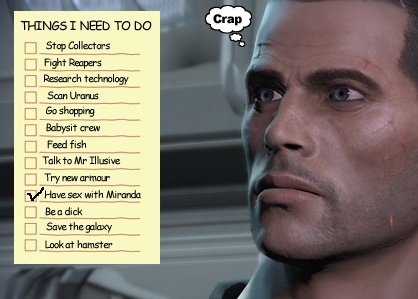Top 7... tricks that make video games highly addictive
Ever wondered why you just can't stop playing?

How do games manage to keep our attention on complete lockdown? Do they beam subliminal 'KEEP PLAYING' messages into our eyeballs? Are controllers and keyboards made with crack-infused plastic that we absorb through our fingertips?
If we had to write an article about it, we'd probably say that these are the Top 7 reasons that video games can take control of our minds so effortlessly...
7. The power of story
Ever since prehistoric man invented imagination, the telling of tales has been an intrinsic part of human culture. And while the quality of some video game stories is so awful it makes us suspect that they may very well have been constructed by grunting cave dwellers, it's undeniable that - regardless of literary merit - just the very presence of a plot is a great motivator in keeping gamers playing.
The desire to find out what happens next - even when we know we don't really care - has always been a trusted device of film, television, comic books etc cunningly employed to keep punters coming back for more. Nothing tingles the excitement glands like a cliffhanger, after all.

The episodic-style chapters of Heavy Rain recently demonstrated how well this can be done in games. No matter whether you consider Quantic Dream's 'interactive drama' to be a lot of preposterous button-wank or the most exciting interpretation of the medium since Shenmue, it was an absolute sticky bastard to put down.
A 'whodunnit' is always hard to resist and most players will have found that the simple need to satisfy their curiosity was the major force that carried them - probably in one or two hefty sessions - to the game's conclusion and the unmasking of the Origami Killer.
And that can be a bit of a pain in the ass. While films, for example, can go from start to finish in a couple of hours, wrapping up the story of a game can take considerably longer. We're still helplessly compelled to get to the end and find out how it all goes down, so all we can do is stay focused and keep playing til we get there. Even if that means foregoing a few hours sleep.
Sign up to the GamesRadar+ Newsletter
Weekly digests, tales from the communities you love, and more
6. The laundry list of completion
Most gamers have an obsessive-compulsive nature bubbling away under the surface. And when presented with a laundry list of objectives that need completing, we are almost powerless to stop playing until we feel as though we've reached a satisfactory point. A point when all immediate chores have been done and we are at peace with our work.
Games are structured in very literal stages. Be they missions, sub-missions, levels, worlds or whatever. Good, generous game design dictates that there are various opportunities to save progress throughout those stages. In theory, we should be able to stop playing whenever we like. But we all know that doesn't happen.

The save point that actually matters arrives only after the 'stage' has been properly completed. Only then - when that satisfactory point of self-imposed 'completion' has been reached - can we stop playing and get on with pressing real-world demands, such as eating, sleeping, conversing with loved ones etc. Any preceding opportunities to save progress are purely for convenience. The game doesn't seriously expect us to give up half way through a mission, surely?
Mass Effect 2 was an absolute killer for this. Not only do a list of primary and secondary objectives pile up like dirty dishes, but there are so many residual objectives also: sub-objectives, scanning new planets, upgrading technologies, trying to have sex with the crew and so on.
Finding that satisfactory cut-off point in a game like Mass Effect takes real mental discipline. There's *always* something else that needs to be done, so there's always a reason to just keep playing. IT HURTS!



